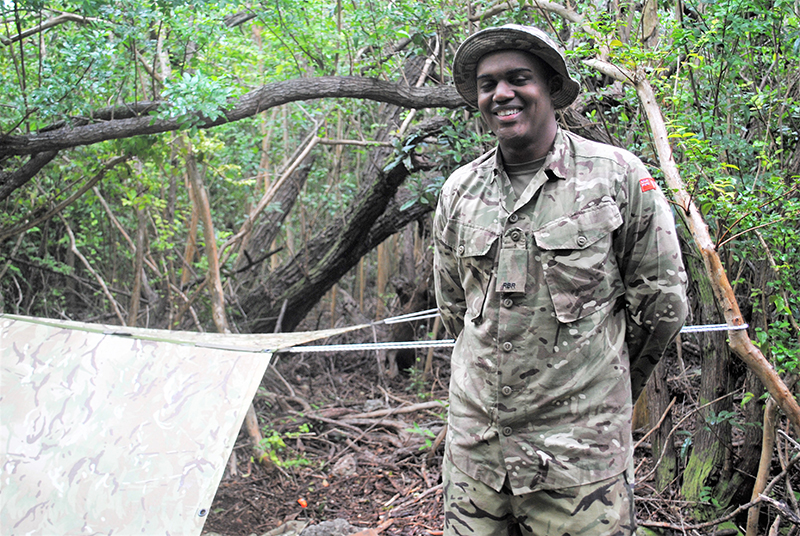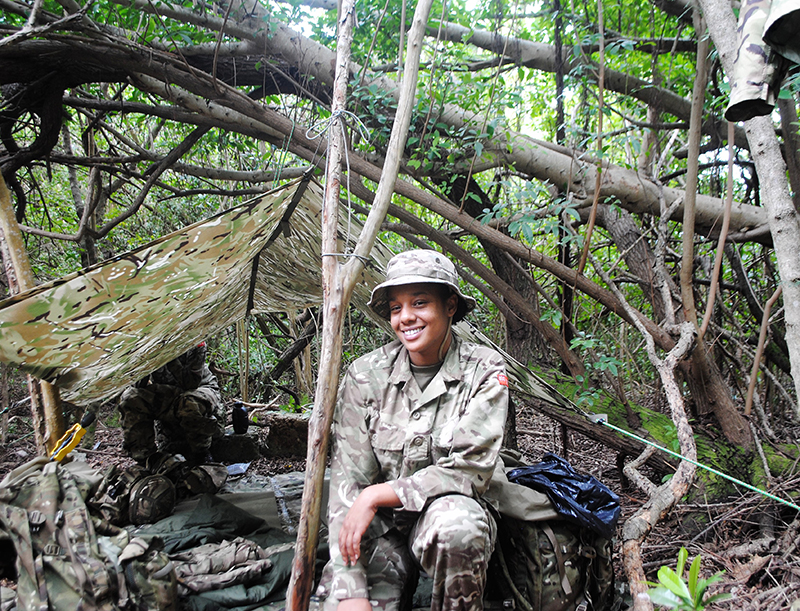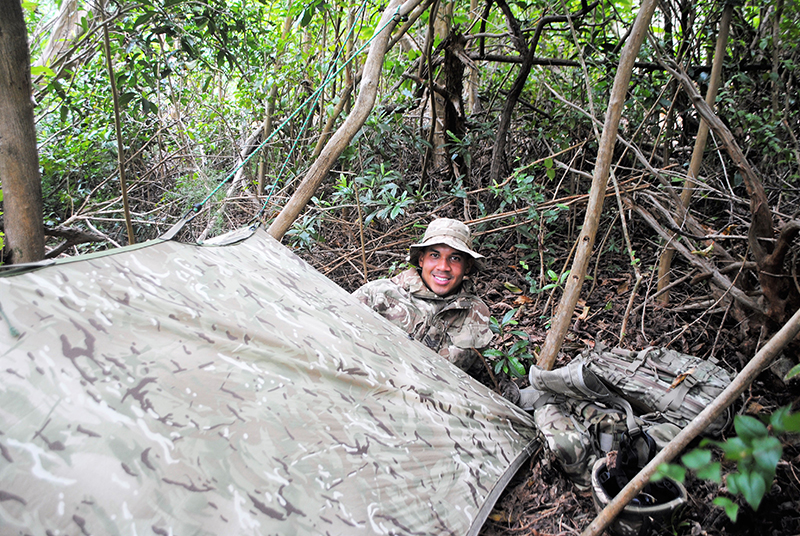New Regiment Recruits Finish Basic Training
[Updated] The Royal Bermuda Regiment’s newest soldiers celebrated the completion of their basic training at the weekend.
The soldiers, who started their military careers at October’s Recruit Camp, finished Exercise Second Strike, a two-day field exercise at Hog Bay Park in Sandys designed to test their retention of the skills they were taught over the last two months, on Sunday.
The soldiers marked the milestone as the RBR prepared to enlist more recruits for its next Recruit Camp.
Private Kwame Bean, 29, who celebrated his birthday in the field last Saturday, said he had enjoyed the field experience – despite heavy rain over the weekend.
Pte Bean, who joined the RBR as a conscript in 2014 but was released to train as a flight instructor in Canada, added: “I love it.
Pte Kwame Bean on Exercise Second Strike at Hog Bay Park
“As a returning soldier, I really enjoy it. I was a conscript before, so I didn’t really have a choice, but I’m glad I rejoined. I like the outdoor activity.”
Pte Bean said his earlier six month stint in the RBR had helped him in ways he could not have imagined – including on his tough training course as a flying instructor.
He added: “We had to do a survival course in flight school and Regiment training helped me sail through it.”
Pte Bean said: “I’m also not a morning person, but the RBR helped me to get into the mindset of being on time and being prepared for all the duties you have to get done on any given day.”
The total of almost 40 trainees and instructors used ponchos to create makeshift tents, perfected harbour skills, patrolling and also got first aid and casualty evacuation experience.
Pte Ricca Butterfield outside her makeshift shelter constructed from a poncho and some bungee cords
Pte Ricca Butterfield, 20, from Paget, a bar tender at Ocean View Golf Course in Devonshire, said: “It’s a lot to take in, but it’s good knowledge.
“It’s things that will help us in field later on and in life in general. You just have to try and remember it all and save it for a rainy day.
“If you’re trained to adapt quickly, that can help you out later. You can utilise that in the field and also in your civilian life. It’s things that can carry you around the world.”
Pte Butterfield added: “I have no regrets about joining the Regiment. I was in the Cadets, so doing this when I’m older was something I looked forward to.”
Sergeant Philip Woolridge, 29, a veteran soldier from Paget, said: “They’ve all done pretty well, although there’s been a hiccup or two. But they’re pretty good – very keen.”
He added: “It has its struggles, it’s not easy, but I enjoy it. I like to make sure they’re all getting it and learning from the experience. It’s good to captivate them as an audience and relate what they’re taught to real life. That helps a lot.”
Sgt Philip Woolridge emerges from his bivouac to take charge of trainee soldiers on the Exercise Second Strike
Lieutenant Samuel Hewitt, 28, who commanded the exercise, said: “Even with the bad weather and having to deal with Covid-19 restrictions, they have all been in remarkably high spirits.
“They’ve retained much of what they have been taught. It’s been a short time frame, but we’ve still got a lot done.”
Major Duncan Simons, the RBR’s Careers Management Officer, said afterwards: “The Regiment has been a breeding ground for leaders for generations.
“It’s a place where people can come and get experience in leadership at a young age and pick up skills they can use their entire lives.
“A lot of the benefits of service are often realised years down the road.
“We teach self-reliance, foster self-confidence and encourage self-discipline, all of which are key attributes in employees in civilian life and our soldiers are paid well while they learn.”
Update 8.01pm: A spokesperson said, “The next enlistment night for next February’s recruit camp will be held at Warwick Camp on Thursday, starting at 6pm.
“Masks should be worn and athletics gear should be brought or worn.
“The entry process will involve an interview, a medical, a fitness test and administration of the oath of allegiance and is expected to take about two hours.”





